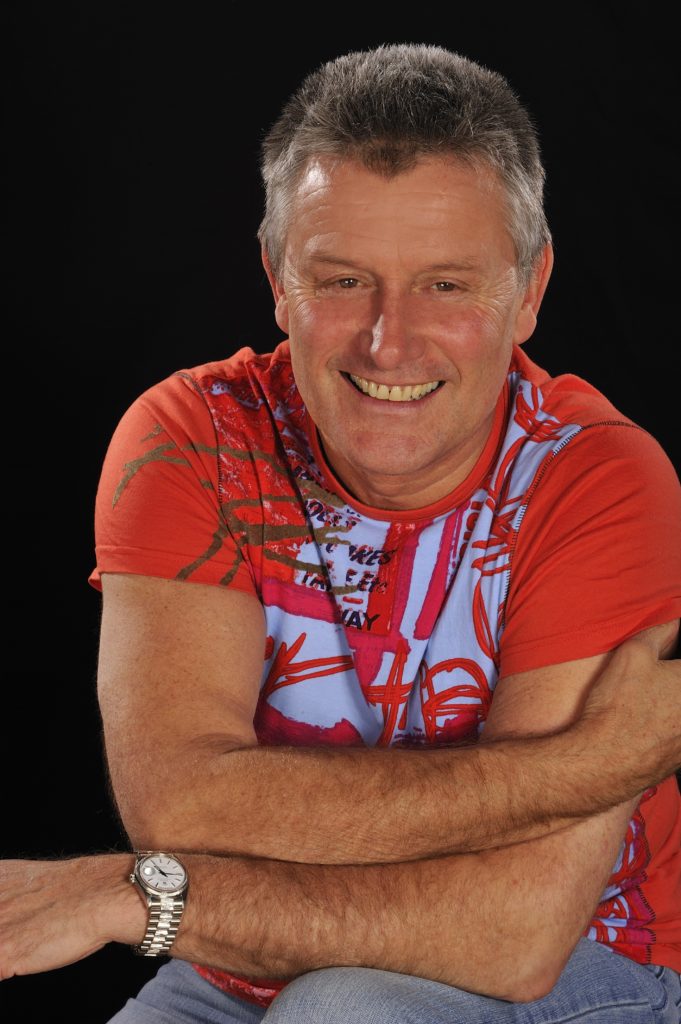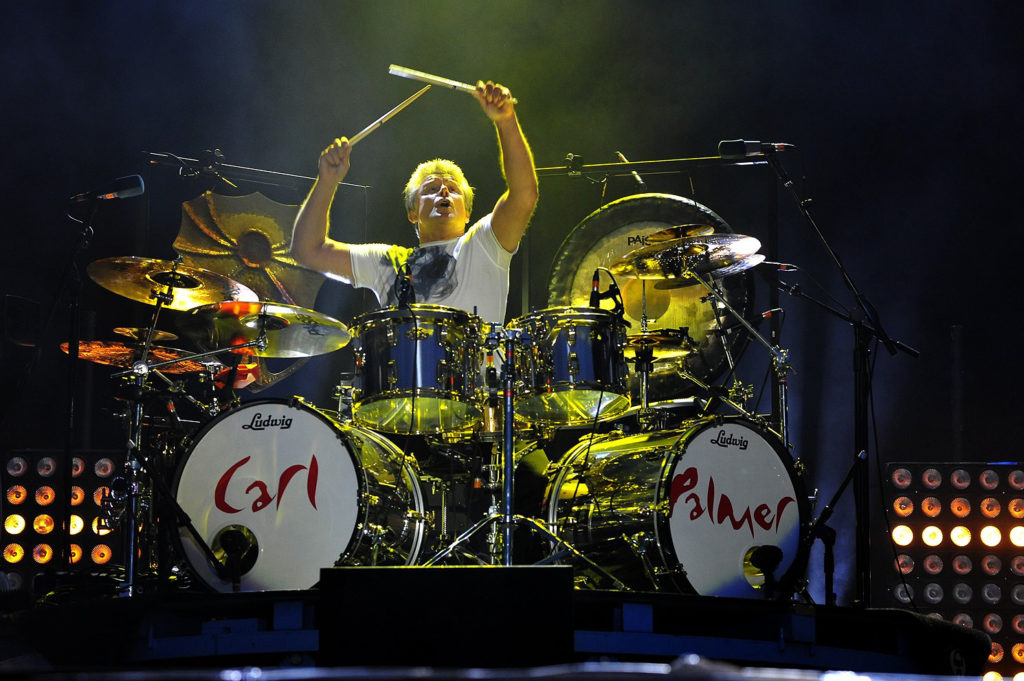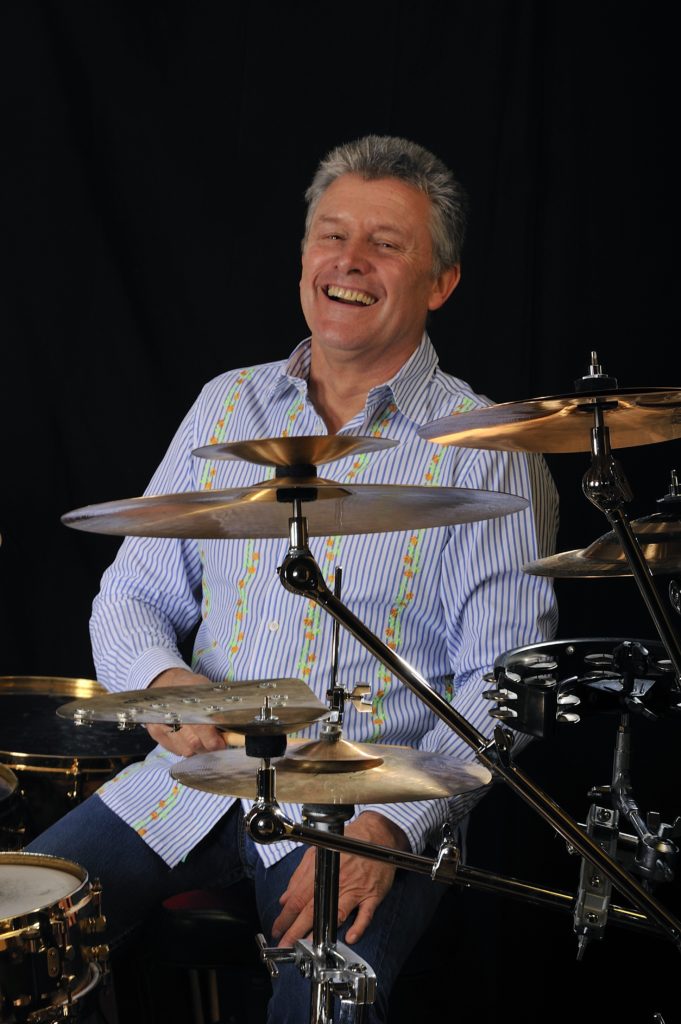
Carl Palmer had been playing songs from his former band, Emerson Lake and Palmer for years as part of his solo project, the Carl Palmer Trio, later renamed Carl Palmer’s ELP Legacy. His reinterpretations of classic ELP songs like Fanfare for the Common Man, Tarkus, Karn Evil 9 and Hoedown were a way to keep the music he helped create alive amongst the band’s loyal fan base, and even win new fans over.
Over the past half-decade it was basically the only way to hear the music, as ELP was no more, to the great sadness of legions of loyalists around the globe.
Palmer tours regularly with his trio, as well as with a reformed Asia, of which he was a founding member in 1982, and rejoined in 2005 when the original lineup of he, Steve Howe (Yes), Geoff Downes (Yes, The Bugggles) and John Wetton (King Crimson) reformed. Asia has since released four studio albums and a number of live records.
The current 2016 tour of Carl Palmer’s ELP Legacy is one that is awash in poignancy, sentimentality and grief, as Palmer has dedicated the entire tour to the life, career and genius of former ELP bandmate Keith Emerson, who committed suicide in March of this year, ostensibly depressed at his declining ability to play music. The tour’s only Canadian stop is June 8 at Molson Canadian Studio (Hamilton Place) in Hamilton.
When Emerson Lake and Palmer (ELP) played its final show in July 2010 at the High Voltage Rock Festival in London, Carl Palmer knew it would be the last time he, bassist/vocalist Greg Lake and keyboard virtuoso Emerson would perform a full show together.
The legendary progressive rock band, which came to international prominence throughout the 1970s on the strength of a combination of folk-inspired hit singles and musically intricate, complex and breathtakingly mesmerizing extended instrumental pieces, had played sporadically throughout the 1990s and 2000s, but in the lead-up to the High Voltage Palmer knew something was wrong with Emerson. He had been contending with a debilitating neuromuscular issue that impacted the dexterity and responsiveness of his right hand. As one of the most brilliant and lauded rock keyboardists of all time, this was a crushing blow, especially for a man who, by all accounts, was quite sensitive.
“I know he was suffering from not being able to play properly because of his right hand and that’s one of the main reasons why I ended ELP, because it was too much of a strain and we couldn’t really perform that well. We did the High Voltage Festival and I kind of called it quits. I said to them ‘I think we need to leave the world with the dream and the memories of how great we were. So let’s not carry on,’” Palmer said from his home in England.
“If you were to speak to bona fide, long-term, long-time ELP fans they would tell you that, yeah the show was good, but it wasn’t as good as it used to be, but it was still great to see them. Well, you don’t want to go out on that premise. You want to go out with people saying, ‘wow, they’re fantastic.’ But we weren’t, and one of us had to say it – and that was it.
“I know for Keith it was getting very difficult to take all of the strain, so much so that we actually used some sequencers for that set, which we played for about an hour and 20 minutes, so he didn’t have to play all the keyboard parts. It took five weeks of rehearsal to find out what could and couldn’t be played and how we should set it up once we knew. I kind of knew that it had to end. Greg Lake didn’t want to end it, but I just figured this was the most honest thing to do. It was certainly the best thing to do for Keith. Yes, there was a lot of money still to be made, but I personally don’t think that way, to be honest.”

Six years on and when Palmer was planning the current tour he had reconnected with Emerson and there were plans for him to join the trio for at least one show, to a special appearance and play a few songs. Emerson was also touring with his own band and, as far as Palmer knew, was doing well and happy – making his sudden, shocking suicide so hard to grasp.
“To tell you the truth for me it’s quite a double whammy because last December Keith and I had spoken about playing together this year. And we had decided we would do it once he was back from a tour of Japan in the middle of May. Keith had already started advertising all this on some YouTube videos. He was telling people about his band and that he was going to Japan and about the music he was going to play,” Palmer explained.
“So we decided not to say anything until he got back and then I shared with him all of my dates that I’ve got so he could pick one. He was going to join me on one date although I think it might have ended up being two, but we were only thinking of one in the beginning. So it’s sad that that’s not going to happen, and I decided to turn it around and basically it’s not a tour about remembering Keith to me, because I was so close to him and I am still incredibly close to his family.”
Palmer was on tour in southern Italy when he got a call from Asia’s management company with news of Emerson’s death relaying a message from his long-time girlfriend Mali Kawaguchi. You can still hear a tinge of incredulous shock in Palmer’s voice when he talks about how he and practically everyone who knew Emerson was truly blindsided by the notion that he would take his own life.
“I spoke to Keith about three weeks before that and we exchanged emails about 10 days before the tragic situation took place and there was nothing to hint or even suggest that this was going on. So there were no signs, there was no descent that any of us could see.”
Palmer firmly believes that Emerson was the best rock keyboardist ever.
“I have been celebrating 50 years as a professional musician and as a keyboard player I would say he’s the best that I have ever worked with. When I was young, I played with some great jazz piano players in my hometown of Birmingham and later some amazing keyboardists, but as for as a Hammond organ player, a piano player, a synthesizer player, he was Mr. First Take every time. He could write and play classical music although that wasn’t his forte. Greg and I knew that he was going to be the greatest rock Hammond keyboard player and he was,” Palmer said.
“Very few people could play synth and piano and Hammond like he could – it was his speciality. If you spoke to [Deep Purple’s] Jon Lord when he was still alive or Rick Wakeman [Yes] or Don Airey {Ozzy, Deep Purple] or even Mark Stein of Vanilla Fudge, they would consider Keith to be one of the greatest Hammond players ever.”
ELP was essentially a guitar-less band. Although there was some acoustic guitar played on the bands more radio-friendly singles, including the massive hit Lucky Man, the music was crafted for bass, drums and keyboards.
For his ELP Legacy configuration, Palmer replicated the trio concept, but with a twist – he would reinterpret ELP music through bass, drums and guitars. His current band is comprised of guitarist Paul Bielatowicz and bassist Simon Fitzpatrick.
“I went with a more guitar-oriented approach because I believe I played with the greatest rock keyboard player ever and there really isn’t anyone that would have matched up with Keith’s playing as far as I am concerned. But also I think the music is so deep and has so much to offer – there’s so much instrumental music even within the ELP tracks that have vocals. For me it was a case of how can I produce this in a different way, even if it’s not as commercial, even if it’s kind of niche. So I went with an emphasis on guitars,” he explained.
“At the beginning of ELP back in 1970, we would have had a guitar player if we could have found one who could have played well enough with us. When we started there weren’t that many really good guitar players, there were only good keyboard players. But now there’s a truckload of guitar players. It’s like the guitar players have taken over in the last 20 or 25 years. That is the true rock and roll instrument and they have become the virtuosos of our time.”
Rather than looking for established players, Palmer scoured the top echelon of music schools in the UK, looking for fresh faces and fresh musical voices.
“I needed to find people that were kind of born out of time, who were a lot younger than me but who loved the music, who had the virtuosity and had some experience and I figured I would put all the keyboard parts onto the guitar, so that was the route for me,” he said.
Bielatowicz has been with Palmer for a decade and was recruited from a music academy in Surrey, while Fitzpatrick came from the Acton Guitar Institute in central London and plays a six-string bass as well as the ‘stick,’ a 12-stringed instrument where six of the strings are used to trigger synthesizer sounds.
“Now, the band isn’t commercial, but if you want classical adaptations played in a prog rock, sort of metal-esque kind of way, with virtuoso musicians and pieces that you also know and already love, then that’s what my band is all about,” Palmer said, adding that there is an interesting cross section of fans who come to the Carl Palmer ELP Legacy shows.
“Obviously there are the die-hard ELP fans who just like to come along and see me and see what I am doing, and they have stayed with me for a million years and I am grateful. Then there are the younger guys who have heard of us from the internet or whatever and are curious about this magic musical trio that has some old guy [he’s 66] on drums. The two other guys are quite young: Simon is 28 and Paul is 36 but he looks about 17. And some of these younger fans are sons of the fathers who loved ELP back in the day. And interestingly there are a few more women who come to these concerts than even came to ELP concerts. I don’t know why, but it’s great to have them at the shows.”

The set list for the current tour is a tour de force musically, with enough familiar numbers to please the more casual fan, as well as some deeper cuts with more instrumental segments to satisfy the most ardent of progressive rock enthusiasts.
“There’s Peter Gunn, which was always an ELP jamming piece, Welcome Back which is also a great piece from ELP. Then there’s Barbarian which we always liked and it was one of the first classical pieces we recorded as Emerson Lake and Palmer. There’s Bitches Crystal, which is like a swirling jazz number with a kind of rockin’ piano from the Trilogy album. That was probably one of the tracks that Keith might have played with us on this tour. We’re also doing Jerusalem and Romeo and Juliet by Prokofiev. And I put into this set one of the first pieces I ever played with Keith and Greg at the very first rehearsal which was King Crimson’s 21st Century Schizoid Man. And I’ve got Knife Edge in the set, which was another track that Keith was thinking of playing on, so we put that in the set. We have Hoedown, Carmina Burana and then my really big tribute to Keith is Pictures at an Exhibition by Mussorgsky, which I put back into the set, especially for this tour,” he said.
“It’s about 22 minutes long and during that piece I’ve got some iconic pictures of Keith happening on the big screen and I’ve got a lot of historical footage from the Russian royal family which I have gathered over the years. Even though the whole set is being designed as a tribute, this section is going to be sort of an extra special tribute to Keith.”
While the entire of the tour is being rededicated to Emerson’s memory, there is going to be a one off tribute concert held on June 24 at the historic Olympia Theater in Miami, where Palmer’s trio will be joined by former Genesis guitarist Steve Hackett and the aforementioned Mark Stein on stage. There will also be a contemporary dance segment, and a children’s choir.
Besides his work with the ELP Legacy project, Palmer is still working with Asia, although ongoing cancer treatments for Wetton and Palmer’s own busy schedule mean a new album will probably not be forthcoming until very late in 2016 or early 2017.
For more information on Carl Palmer’s ELP Legacy and his other projects, visit his website at www.carlpalmer.com.
For tickets and information for the June 8 show in Hamilton, visit http://www.coreentertainment.ca/events/detail/carl-palmer
* Jim Barber is a veteran award-winning journalist and author based in Napanee, ON, who has been writing about music and musicians for a quarter of a century. Besides his journalistic endeavours, he now works as a communications and marketing specialist. Contact him at jimbarberwritingservices@gmail.com.
https://www.youtube.com/watch?v=OgpnlLz7WR0
SHARE THIS POST: